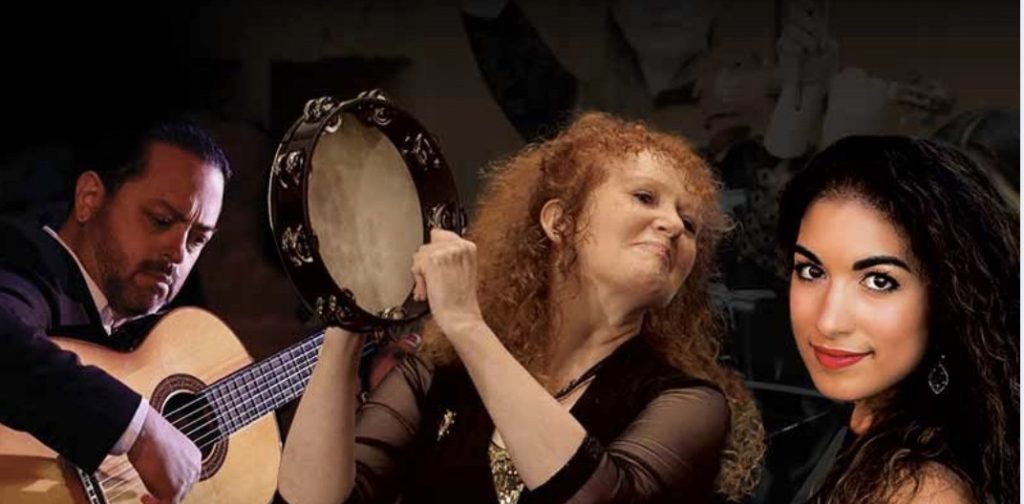by Kevin McLaughlin

Their most recent show, “Hispania, a Voyage from Spain to the Americas,” is ostensibly an excursion by sea through sixteenth-century Spain and Latin America in ballades, dances, and instrumental fancies. But where another period ensemble might have rowed their boat with deliberate and reverential strokes, Jeannette Sorrell and her joyous troupe made this trip a theatrical thrill ride. I attended the performance at St. Rocco Parish on March 21.
For those unfamiliar with the instruments and milieu, guitarists Jeremías García and William Simms gave a pre-concert demonstration that helped demystify baroque and flamenco guitar techniques. We now had friends in the music business, or at least a couple of faces we could later recognize in the band.
Apollo’s Fire were their usual accomplished and exuberant selves, the kind of musicians who are disinclined to sit still. They swayed, reveled, and wholly involved themselves in the music making, as if each note were a group product. Concertmaster Alan Choo, whose violin was recently stolen, played on anyway (presumably on a borrowed instrument) with his customary off-the-leash abandon, goading his colleagues to do the same.
As an opener, El Cant del Ocells (Song of the Birds) had Choo solo-strolling from the back of the church to the front with his stand partner Emi Tanabe close behind, ultimately joining sopranos Sophia Burgos and Andréa Walker onstage — a nice physical depiction of nature’s reawakening. Sorrell also lent her voice to the act, singing harmony in support of the two vocal songbirds.
In her Apollo’s Fire debut, soprano Sophia Burgos provided ample justification to have her back, and soon. With a radiant singing voice and charismatic stage presence she gladdened the heart, whether singing songs of pleasure or sadness. She demonstrated her opera bona fides in Manuel De Falla’s aria Vivan los que ríen, and then moved us with Lamento Borincano, a Puerto Rican lament given special authenticity by this “proud Puerto-Rican American.”
García, a relatively late addition for these concerts, showed consummate guitar skill in several solo turns, with his biggest moment coming in Francisco Tárrega’s Capricho Árabe. His tone was so ravishing it made you blush, and he had an equal supply of digital dexterity and musical imagination.
After intermission, two delightful Santiago De Murcia pieces arranged by Sorrell showed off the strings and percussion. In Gaitas, a droning cello impression of bagpipes by Shiffer was all the inspiration Choo and Tanabe needed for their duo jams. Fandango was a street party of sorts, with harpist Anna O’Connell, castanetist Gina Petrella, and tambourinist Anthony Taddeo each showing an ability to enhance and elevate the playing of their colleagues. Two Recercadas by Diego Ortiz featured Shiffer in thundering solos.
Sorrell played tambourine and sang more than she conducted in this show, though her hand was evident in the planning and guidance of the program, not least for her musical interpretations. Like an anthropologist, she uncovers and releases music from its hiding places and lets her players take it from there.
This was Apollo’s Fire’s first appearance at St. Rocco Parish, and judging by the agreeable acoustic and enthusiastic response by the audience, there ought to be many return visits.
Published on ClevelandClassical.com March 26, 2024.
Click here for a printable copy of this article



